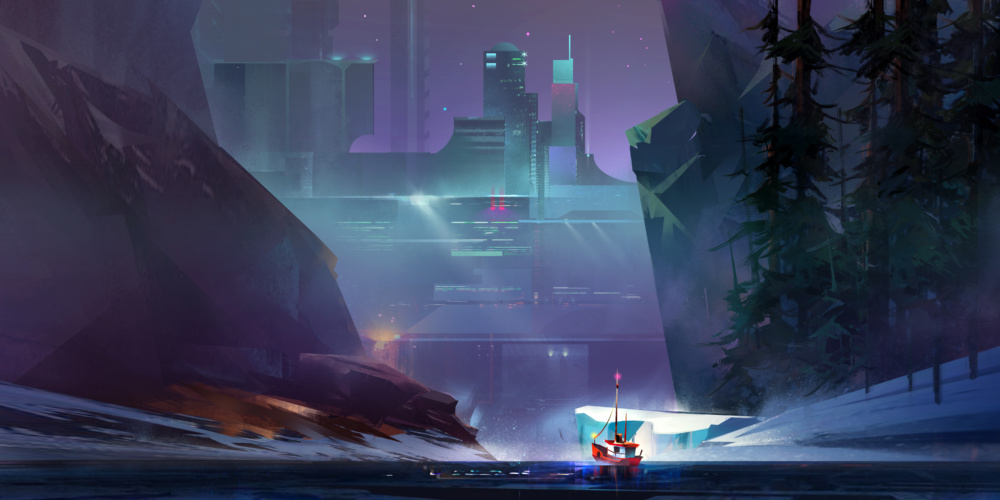Scanning through last month’s issue, several articles caught my eye. The first was about the inaugural flight of Boeing’s Loyal Wingman autonomous aircraft, and the second concerned the lighter-than-air blimps being developed by Hybrid Air Vehicles in the UK. As a science fiction writer, I immediately concatenated the two notions and began to imagine AI-controlled airships carrying passengers and cargo around the globe, plying their routes without need for human guidance.
I was still pondering this idea when I came to an article about the Scandinavian container ship Yara Birkeland, which is the world’s first battery-powered autonomous vessel. Automated logistics will load chemicals onto the ship before the vessel steers itself to a container port where yet more automated systems will unload it.
Of course, this chimed with my notion of self-piloting airships, and I began to imagine an entire infrastructure in which machines harvest raw materials at one end, which are then shipped to automated factories, and the resulting products delivered without human intervention at any stage. You want more flat-pack sofas? The robots go out into the forest, cut down the trees and transfer the logs to a processing ship, which delivers ready-cut pieces to a packaging plant that bundles them up and arranges for self-driving trucks, ships and airships to deliver them to stores around the world.

Beyond that, the article on hydrogen-powered trains suggested such arrangements could also be provided for passengers. Trains, after all, don’t have a lot of choice about their routes. All they need to do is follow the rails and not hit anything. So, we could easily factor in a network of automated public transport, with major cities as hubs, in which a Londoner could order a self-driving taxi to take them to Paddington, from where they could catch an automated train to Heathrow, where they might board a passenger airship bound for New York.
The final article that caught my eye concerned the developments of freeports in the UK, where the Chancellor recently announced the creation of eight such entities. He defined a freeport as ‘An area inside the UK geographically, but legally outside of the UK customs territory.’ This means goods and raw materials can be imported, assembled and exported without paying domestic duties or tax.
Freeports would naturally become nodes in these imagined automated passenger and freight networks. Advocates imagine them becoming centres of innovation, with the economic ripples spreading out into the surrounding communities and attract people to live and work near the freeport zones—while critics worry they could become cut-off from the regions in which they sit, thriving whilst the rest of the country withers economically.
I immediately imagined the famous freeports of the genre: Mos Eisley, Babylon 5, Deep Space Nine… They are portrayed as romantic, slightly disreputable places, with thriving black markets and an underclass of hustlers, scoundrels and smugglers taking advantage of the facility’s interstitial legal status. Would modern freeports attract such people? A thriving port would certainly need the support systems provided by the hotel, food and leisure industries. Wherever wealth is generated, a secondary economy arises to provide for the workers and itinerant travellers.
I found myself picturing a dystopian future scenario set a few years later, in which the human race had succumbed to a new, deadlier pandemic and our automated supply chains still rattled along oblivious of our demise
My science fiction brain pictures these places in a hundred years. While much of the country exists in agrarian poverty, these freeports are enclaves of prosperity, served by automated cargo systems that connect them to similar ports all over the world: a global meta-nation of trade and travel freed from the states within whose borders they nominally sit.
READ MORE SCIFI EYE COLUMNS HERE
It sounds exciting, but with control of the ‘roads’ of this new empire, the freeports would be able to dictate terms to their hosts. If the government became too interfering, the ports could threaten to cut off their supplies of certain items, maybe even redirect them to other markets. In this way, the ports themselves could become the seats of political control, endorsing certain parties or candidates in order to strengthen their own positions.
That’s a hell of a setting for a modern retelling of Casablanca.
But I wasn’t done yet. I found myself picturing a dystopian future scenario set a few years later, in which the human race had succumbed to a new, deadlier pandemic and our automated supply chains still rattled along oblivious of our demise, creating and shipping goods no one would ever use; where empty buses and trains still ran their scheduled services—at least until their batteries expired or their solar panels degraded. A melancholy vision of the slow breakdown of unthinking systems in an empty world.
Gareth L. Powell writes science fiction about extraordinary characters wrestling with the question of what it means to be human. He has won and been shortlisted for several major awards, and lives in Bristol, UK with his children. You can find him on Twitter or Instagram @garethlpowell










BEAS funding available to help businesses cut energy costs
And not a moment too soon, if the following exchange broadcast last Friday 13th June, on the Radio 4 ´Rare Earth´ program (link below, ~ 17 minutes...